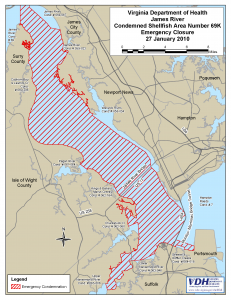Flooding leads to closure of shellfish harvesting in two Va. rivers
MECHANICSVILLE, Va. — The Virginia Department of Health has closed portions of two Virginia rivers to shellfish harvesting because of potential pollution in floodwaters triggered by heavy rains in western Virginia.
The affected rivers are the James and Rappahannock. All of the lower James River, from the vicinity of Hog Point in Hog Island State Wildlife Management Area to the vicinity of the Monitor-Merrimac Memorial Bridge-Tunnel is closed. The closed portion of the Rappahannock extends from the vicinity of Accopatough Beach in Richmond County down to a line between Monaskon in Lancaster County and Stove Point in Middlesex County.
The emergency closures apply only to bivalve mollusks — such as oysters, mussels, and clams. Crustaceans, such as crabs, and fin fish are not affected.
The closures went into effect on January 27. Michelle Peregoy, a spokesperson for the Virginia Department of Health, said the closures are expected to remain in force for at least two weeks.
When heavy rains fall in western Virginia, there is a potential for runoff laden with chemical pollution and animal and human waste. Filter-feeding organisms, such as bivalves, tend to concentrate pollutants and pathogens in their tissues and make it easier for humans who eat the shellfish to get poisoned or ill afterward.
Peregoy said the primary concern is that the contaminated runoff may carry pathogens that cause a number of water-borne diseases. Those of particular concern are hepatitis a virus, norovirus, Salmonella, and Shigella.
The emergency closures will remain in effect until testing indicates that it is safe to resume the harvest.
— David M. Lawrence
Leave a Response
You must be logged in to post a comment.





You must be logged in to post a comment.